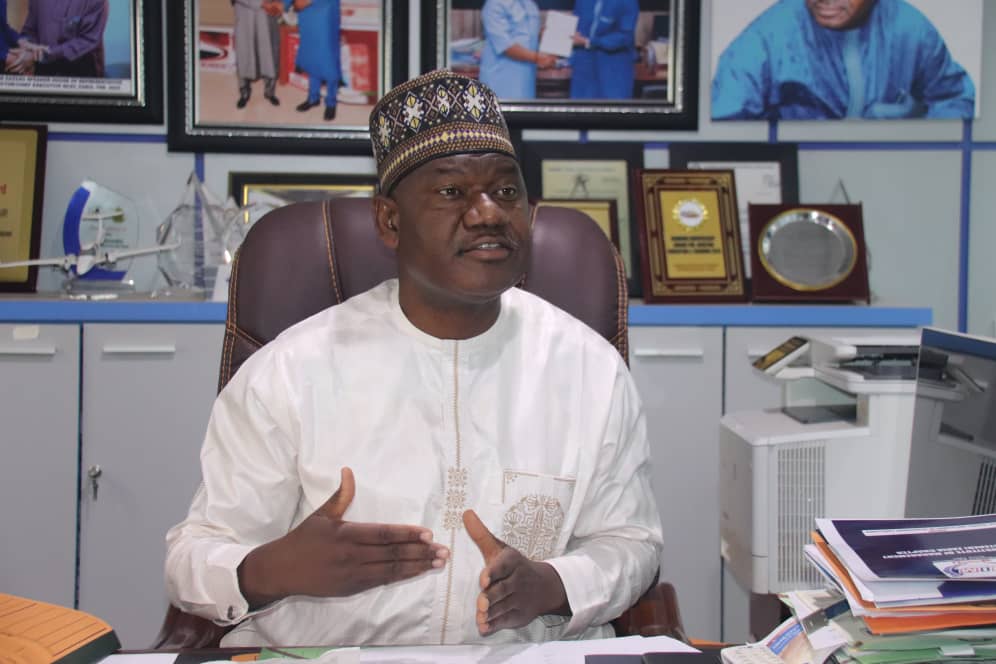NCAT Unveils Bold Vision to Transform into Africa’s Premier Aviation Training Hub

The Rector and Chief Executive of the Nigerian College of Aviation Technology (NCAT), Dr Danjuma Adamu Ismaila, has disclosed sweeping plans to transform the college into a world-class aviation training hub capable of attracting students from across Africa and beyond, while identifying critical infrastructural and funding challenges currently limiting the institution’s potential.
Speaking during an exclusive interactive session with members of the League of Airport and Aviation Correspondents (LAAC), who recently completed a one-week training programme at the Kaduna-based college, Dr Ismaila emphasised his mandate to reposition NCAT for financial independence and international relevance.
“The college has the potential to serve the training needs of not just Nigeria, but the entire African continent and even other parts of the world. With certification from the NCAA, which aligns with ICAO standards and is equivalent to the UK CAA, our training is globally recognised,” he said.
According to the Rector, the college is already conducting specialised courses in partnership with ICAO, bringing in foreign exchange and building NCAT’s global reputation. However, the lack of sufficient accommodation and outdated infrastructure has constrained the college’s capacity to admit more students, both locally and internationally.
“This is one of our greatest challenges. We currently have to accommodate some trainees, like yourselves, outside the campus. The previous management did not invest aggressively in infrastructure, but we—alongside the Honourable Minister of Aviation—are working day and night to change that,” he assured.
Dr Ismaila revealed that NCAT recently trained aviation professionals from several French-speaking African countries in Aviation English and is set to train a group of Egyptian air traffic controllers in June. However, demand is outpacing capacity.
“Our charges are competitive and attractive to most African countries, especially when compared to training costs in countries like the United States, where students grapple with high hotel bills and dollar-rated expenses,” he noted.
The NCAT boss highlighted the urgent need for investment to revamp college infrastructure—most of which dates back to the 1960s—to meet international standards and appeal to globally minded students.
“Our buildings need to be modernised. We’re upgrading classrooms, technical facilities and training equipment to expand our intake, especially for critical areas like air traffic control. We’re also working on acquiring a 3D simulator that will allow us to train more personnel at once,” he said.
One of the college’s most anticipated assets is the Boeing 737 full flight simulator, which is yet to be commissioned despite being purchased five years ago. Dr Ismaila disclosed that he has set up a task force with a three-month mandate to address all outstanding issues preventing its deployment.
“The NCAA has now agreed to begin the certification process, and within the next one to two months, the simulator will be operational. Once this is achieved, we expect a surge in participation from pilots, including those from Asia, who currently travel to Dubai for simulator training. This will greatly boost our foreign exchange earnings,” he explained.
He added that the choice of the B737 simulator was based on market demand, as it remains the most widely used aircraft in Nigeria. He noted that if the simulator gains traction in the market, NCAT would consider acquiring simulators for other popular aircraft such as the CRJ.
On projections for 2025, Dr Ismaila admitted that it would be difficult to make accurate forecasts without first securing the necessary funding to increase capacity.
“I’m currently engaging the government to secure funding to develop our infrastructure and procure the needed equipment. Only then can we accurately project our student intake and revenue generation,” he said.
Although he did not provide an exact funding figure, he stressed that addressing ‘low-hanging fruit’—such as the activation of dormant training equipment—could significantly enhance the college’s output in the short term.
Another major hurdle confronting NCAT is staff attrition due to poor remuneration. Dr Ismaila lamented that NCAT currently pays the lowest salaries among all aviation agencies in Nigeria, prompting many skilled instructors to leave for the private sector or foreign opportunities.
“We’re bleeding talent. That’s why we are working on a policy to retain trained staff. Going forward, we’ll implement a bond system that ties certification to service within NCAT. If we train you, you must stay and contribute,” he asserted.
He also revealed that discussions are underway with the National Salaries, Incomes and Wages Commission to secure special salary considerations for NCAT, similar to what is obtainable in the Petroleum Training Institute, where salary gaps with the oil industry have been minimised.
“We need that kind of treatment to retain our experts. There is currently a significant salary disparity that must be addressed,” he added.
Dr Ismaila’s tenure at NCAT is shaping up to be one of transformative ambition grounded in the reality of infrastructural, financial, and human resource challenges. Yet, his vision for an internationally recognised, self-sustaining aviation training institution—capable of serving Africa and beyond—is beginning to take shape.
If the necessary support from the Federal Government materialises, NCAT may soon become the epicentre of aviation training on the continent, offering cutting-edge facilities, attracting global trainees, and strengthening Nigeria’s position in the international aviation ecosystem.







